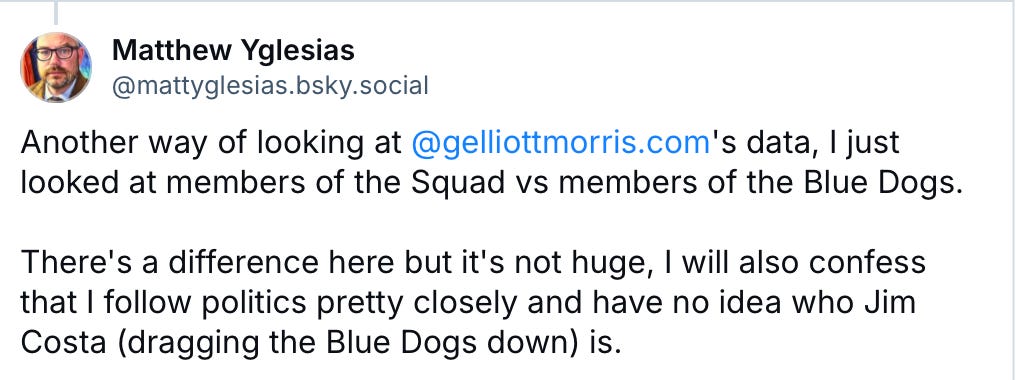Moderation is not a silver bullet
In 2024, moderate candidates for the U.S. House barely outperformed the average partisan
Yesterday, Strength In Numbers released our first-ever estimate of U.S. House representatives' "Wins Above Replacement" (WAR). The reception has been very positive, and I'm pleased with how much the community has engaged with our (open-source!) model. We have the best and most comprehensive publicly available measure of House candidate skill, and we plan to expand on this — including publishing historical Senate races and estimates for all candidates, not just winners. Thanks to SIN contributor Mark Rieke for making this possible.
Of course, numbers are just numbers. We need to attach meaning to them to make them insightful. WAR and WARP are useless if they're just data points on a screen.
One way that people commonly try to attach value to a number like WAR/P is to see if ideological moderates outperform progressives. This is something of a hot topic in the Democratic Party strategy discourse right now1, and was a subject of some academics-vs-consultants debate earlier this year. For example, here's blogger Matthew Yglesias (firmly in the moderation camp) using our WAR/P metric to make the case for electing moderates:
There's just one problem: Our model suggests that ideological moderates do not substantially2 outperform their party's average member in 2024. Cherry-picking representatives that you identify, for other reasons, as “moderate” dramatically overstates the electoral benefit of actual empirical moderation. While there used to be a large premium for ideological moderation, it has decreased markedly over the last 25 years. In our estimates, moderates do have higher WAR scores on average, but the hypothetical improvement in vote margin due to those values is dwarfed by the uncertainty in House elections.
I estimate that strategic moderation in 2024 could have increased a Democrats’ vote share by 1-1.5 points and their chance of winning by just 10% — not enough to overcome the uncertainty driven by other factors in the election. This is not to say that moderation doesn't matter, but lots of other factors matter more. Ideological positioning is only one lever the party can pull to increase its vote share in an election, and given the small substantive impact on outcomes from moderation, the tradeoffs should be carefully considered. I don’t think moderation is worthless, I just think it’s overrated.
Let me show you what I mean. The code for this analysis is linked at the bottom of this post.
The rest of this article is paywalled for paying members of Strength In Numbers. This is the kind of deep-dive, empirical work that takes time to get right — and that you won't find anywhere else. We are building something here that cuts through the punditry and partisan noise to give you the data-driven insights you need to understand what voters actually care about and what's actually happening in American politics.
Paid subscribers get enhanced forecasts, exclusive polling analysis, live election-night modeling, and access to our community chat where we dive into the crosstabs together. Plus, you help keep this work independent and accountable only to the data, not corporate owners or algorithmic bias.
Your support makes rigorous, transparent political journalism possible.




